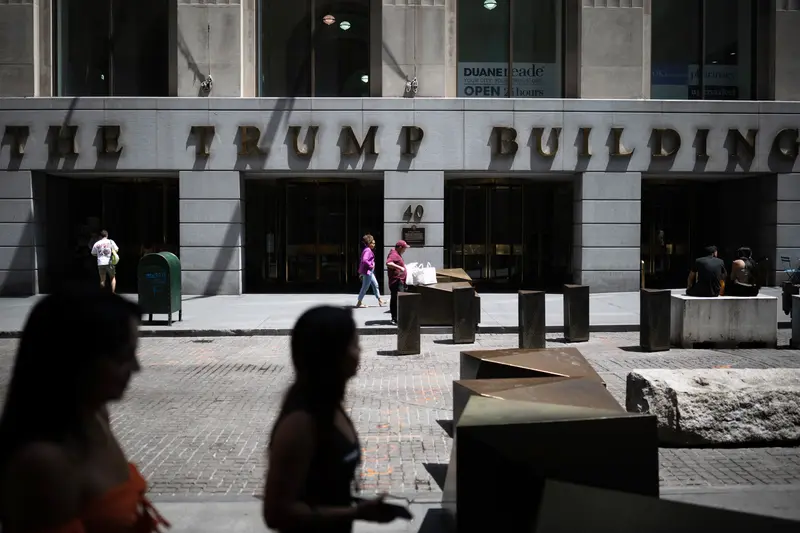After months in which indictments in four successive criminal cases against Donald Trump raised the stunning, if distant, prospect that a former U.S. president could be put behind bars, it was the seemingly less momentous civil case in New York that this week generated the most tangible consequences so far: A dramatic fraud ruling that, if it survives appeal, could strip Trump of a chunk of the business empire that not only made his fortune but provided him with his very identity.
New York State Supreme Court Justice Arthur Engoron, having previously made a preliminary finding that Trump, his sons and some Trump Organization executives “had a propensity to engage in persistent fraud by submitting false and misleading Statements of Financial Condition,” granted a partial summary judgment in favor of the state of New York. “Even with a preliminary injunction in place,” his lacerating opinion noted, “and with an independent monitor overseeing their compliance, defendants have continued to disseminate false and misleading information while conducting business.”
Engoron canceled certificates for Trump entities controlling some of the former president’s properties, which they need to operate legally in New York. Trump could also be required to give up a portion of profits linked to the properties, depending on the outcome of a civil trial that is scheduled to start next week. An appeals court on Thursday said the trial can proceed without delay.
The seeds of the state’s case date back to 2019. In February of that year, former Trump lawyer Michael Cohen claimed in a congressional hearing that Trump had manipulated the values of his assets. “It was my experience that Mr. Trump inflated his total assets when it served his purposes, such as trying to be listed amongst the wealthiest people in Forbes,” Cohen testified, “and deflated his assets to reduce his real estate taxes.”
On Oct. 16, 2019, ProPublica published a story that revealed a series of “stark” inconsistencies between what the Trump Organization had reported to property tax authorities about the financial health of his landmark skyscraper at 40 Wall St. and what the company told lenders. The discrepancies made the building appear more profitable to the lenders, and less so to city tax officials. A real estate and finance professor told ProPublica at the time that the discrepancies were “versions of fraud.” Former New Jersey Attorney General Anne Milgram said, “Certainly, if I were sitting in a prosecutor’s office, I would want to ask a lot more questions.”
On Dec. 7, 2019, according to Engoron’s ruling, New York Attorney General Letitia James subpoenaed the Trump Organization. Three years later, the state sued, claiming that Trump, his company and his associates grossly misstated the value of some of his properties on statements of financial condition shared with lenders and insurers. They included 40 Wall Street, Trump Tower, Trump Park Avenue, his Seven Springs Estate in Westchester, Mar-a-Lago and property near his Scottish golf course in Aberdeen.
In this week’s ruling, Engoron called James’ evidence “conclusive.” Between 2014 and 2021, he wrote, Trump and others overvalued his assets by $812 million to $2.2 billion.
In a social media post, Trump called the accusation that he committed fraud “ridiculous and untrue” and called Engoron “DERANGED.” James is a Democrat, and Trump has maintained her investigation is politically motivated. He has denied wrongdoing.
At 40 Wall Street, Engoron’s decision said that in 2015, Trump Organization statements of financial condition overstated the property’s value by nearly $200 million. Though the company had received an appraisal in 2015 saying the building was worth $540 million, which James contended itself might have been an inflated amount, Trump statements of financial condition put the value at $735.4 million that same year.
In a November 2019 story, ProPublica also found discrepancies in the amount of commercial space the Trump Organization claimed was occupied in Trump Tower — differences that made it appear in statements to a lender that the building was financially healthier than it seemed in documents provided to tax authorities.
Engoron’s decision said Trump also submitted statements of financial condition that described the roughly 11,000-square-foot triplex apartment where he has lived in Trump Tower as nearly three times the size it is, the judge said. “A discrepancy of this order of magnitude, by a real estate developer sizing up his own living space of decades, can only be considered fraud,” he wrote.
In response to the ruling, an attorney for Trump, Christopher Kise, said in a statement emailed Wednesday that the decision was “outrageous” and “completely disconnected from the facts and governing law.” He said that the judge disregarded the views of those involved in the loan transactions, who he said testified that there was no fraud and that the transactions were highly profitable. He said the decision “seeks to nationalize one of the most successful corporate empires in the United States.” Trump’s legal team has said it will appeal the ruling.
Through a spokesperson, James said after the ruling that “we look forward to presenting the rest of our case at trial.”
Andrea Bernstein contributed reporting.






